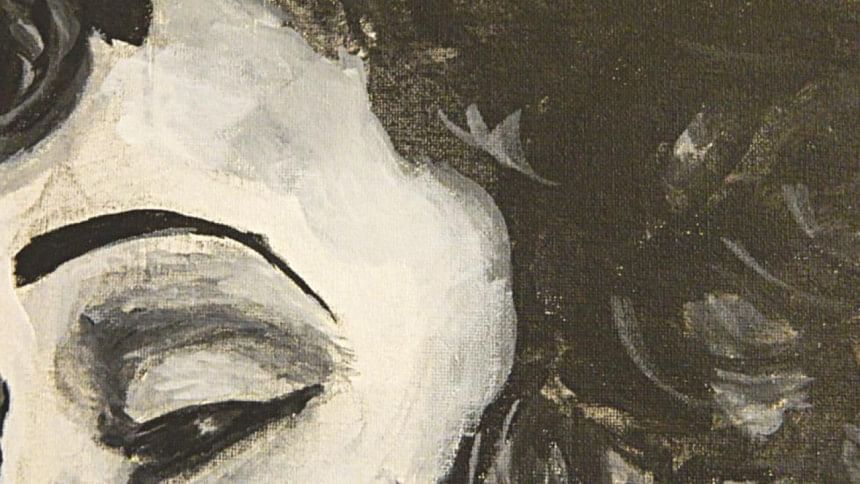No country for Beauty

SOMETHING remarkable happened this week.
Babul Mia of Habiganj—who had raped Beauty Akhter (16) earlier in the year—had her raped again and killed for not withdrawing the rape case pending against him, surprising no one.
That's the remarkable thing, in case it's not clear: that no one was surprised. I think this means that we are finally desensitised to rape.
Pictures of Beauty's dead body are all over social media. That she is lying dead on the grass wearing a red shalwar-kameez is evocative of the national flag. That the killing happened days before Bangladesh celebrated its 47th year of independence is particularly chilling. I can almost hear an old friend in my head: is this the Bangladesh we wanted? I don't have an answer to that right now. Just saying "no" doesn't cut it. Not anymore.
I am perturbed by the imagery. Every time a woman is raped, pictures of her body make the rounds, the female body is highlighted as a normative location of violence. On a month during which nationalist sentiments run high, her body symbolises the nation as mother. O ma phagune tor aamer boner ghrane pagol kore. And March smells of death. Just like it did 47 years ago. Trigger warning: war. The real world doesn't come with trigger warnings, though. Beauty didn't get one. No one does.
So, why is Beauty's body being compared to the mother/nation? Because that is how national victimisation is formulated. Our narrative about the War of Liberation remains one of victimhood, one where we speak of the horrors of war, the Birangonas, the death toll. Victors write history, we are told, but our history books have been revised so many times that the only credible sources of information are our family members. And they are not allowed to forget the atrocities that they were exposed to. They have to relive their trauma every year as the nation celebrates independence. Television channels, newspapers, new media—all come together to revisit that history, day by day, play by play.
So a rape that occurs in March is echoed by what is on television—pictures of victimhood. So when Beauty was raped in the emotional month of March, she automatically became a symbol for the nation: a symbol of victimhood, a symbol that was unnervingly close to home. One would think that such symbolism would be an impetus behind trying to protect all the Beautys of the world. But no, it's the opposite. Both the nation and its women become bigger victims of plunder. These events show the path for more violence.
But here's a more important issue at hand: Beauty and her family did everything that we want families to do when a rape occurs. They sought due process. They filed a case against the rapist. Beauty's family did not blame the victim. In fact, they tried to protect her. Because Babul used to harass her, she stopped going to school. This is what happens in Bangladesh. School enrolment of girls surpasses that of boys in primary school and then steadily declines. Girls drop out of secondary school because they are sexually harassed on their way to and from school. Some, like Beauty, are raped in spite of it. And if they speak out against the rape, they are silenced.
But, no one is surprised. This is, after all, the new normal.
We live in a region where too many people think that rape is akin to having sex, where the idea of consent is blurry. The idea of consent is blurry in other parts of the world as well, truth be told, but I wonder if it's particularly crude in Bangladesh. Maybe this is what happens when sex education is replaced by illegally sourced pornographic material. But then, who needs pornography when there's Bollywood, teaching men the ABCs of sexual harassment since the 1900s. Remember "Koi haseena jab ruth jati hai toh au bhi haseen ho jati hain"? I don't either. It's a song from Sholay. Here's a rough translation sourced from the Internet: "Oh silly girl, you pushing me away just makes me want you more, you know that right?" If Dharmendra can get lucky, why can't Babul, right? Because Dharmendra ends up marrying the woman he's singing that song to (Hema Malini, if you need to know).
There are more women's organisations—be they local or international—than ever before in Bangladesh. In addition, there are corporations that take on "women's empowerment" as an agenda, promising to make lives better for women. So why are women still being raped and murdered by men? Was "empowerment of women"—whatever that may mean to each organisation—supposed to help women prevent their own abuse? Is that because women were/are the cause of said abuse?
What women's organisations needed to do was to rupture the system, i.e., patriarchy and capitalism, but that didn't happen. Patriarchy lives on intertwined deeply with capitalism. They together produce violence.
Moreover, when women's rights become a corporate mandate, that's bound to produce cursory responses. For example, when banks say they have special accounts for women. Does that mean they have women-only lines that prevent them from getting pinched in the butt while they stand in line? Does it mean they are protected from lecherous bank officials? Does that mean they are assured that they won't be propositioned? No, they are just a "market segment" ready to be cashed in on.
I've heard men say that rape has been politicised. That women can cry rape and get away with it these days. And that can happen, sure. But that does not happen systemically or systematically. That occurs at random. Here is what is not random: rape of men, women, children, transgender individuals. Rape is part of a patriarchal-capitalist system that creates inequality, isolation, angst, tension, competition, exploitation, and toxic masculinity. Most rapists are men.
There are more women on the streets, more women at the workplace than even 20 years ago. This threatens men. Men who haven't been brought up to speed with women. While women have been taught to fight and speak out like Beauty did in the face of the masculine brutality of a man twice her age, men have been left to watch Bollywood movies and its derivatives. When they re-enact Dharmendra's song and dance routine, women resist, and end up being raped and killed.
And then blamed for their own death.
Still, no one is surprised by it.
Nadine Shaanta Murshid is Assistant Professor, School of Social Work, University at Buffalo, The State University of New York.





Comments